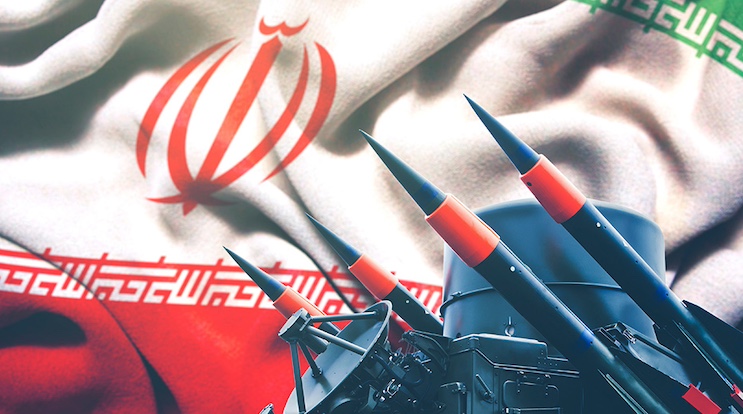
Iran has ignited global alarm by threatening to pursue nuclear weapons, escalating fears of a World War III arms race. On Monday, lawmaker Ahmad Naderi pointed to North Korea as a blueprint, claiming a nuclear arsenal would shield Tehran from U.S. aggression—a bold shift in rhetoric that amplifies tensions amid stalled talks and warnings of American retaliation.
Naderi, a key figure in Iran’s Parliament Presidium, made the case just days after former U.S. President Donald Trump threatened devastating airstrikes if Iran rejects a new nuclear deal. The remarks peel back decades of Tehran’s insistence that its nuclear program is peaceful, exposing what critics call the regime’s true ambitions. Supreme Leader Ayatollah Ali Khamenei has doubled down, vowing swift reprisals against any U.S. attack, as Iran’s provocative stance risks plunging the region—and the world—into deeper conflict.

BYPASS THE CENSORS
Sign up to get unfiltered news delivered straight to your inbox.
You can unsubscribe any time. By subscribing you agree to our Terms of Use
Naturalnews.com reports: The brazen suggestion from Naderi, paired with Khamenei’s threats, reinforces concerns that Iran’s leadership views nuclear weapons as leverage rather than a red line. With Tehran rejecting direct talks and doubling down on uranium enrichment, the regime appears to be testing Washington’s resolve, betting that nuclear brinkmanship will extract concessions rather than invite further isolation.
Trump Launches Chemtrails Task Force with Power to Arrest ‘Geoengineering Criminals’
Iran looks to North Korea
Naderi’s comments, posted on X, were explicit: “Observing Trump’s behavior and speech during his first term with North Korea shows that having a nuclear weapon has brought security to Korea.” He added, “For a long time, many elites and sympathizers of the country and the [Islamic] Revolution have been calling for the bomb to be tested and announced. If we were also armed with nuclear weapons, Trump would not dare to threaten bombing.”
The comparison to North Korea is particularly alarming. Pyongyang’s nuclear arsenal has shielded it from direct military confrontation, even as it continues missile tests and aggressive posturing. Naderi’s argument suggests Iran’s hardliners see nuclear weapons as the ultimate deterrent — a stance that directly contradicts Tehran’s official insistence that its nuclear ambitions are solely for energy production.
Trump’s recent threats — “It will be bombing the likes of which they have never seen before” — were met with defiance from Iran’s leadership. Khamenei warned Monday that any U.S. attack would be met with “a strong reciprocal blow,” while Ali Larijani, a top adviser to the Supreme Leader, declared that an American strike would “force Iran to move towards [nuclear weapons] because it has to defend itself.”
A regime that only understands strength
Iran’s rejection of direct negotiations despite Trump’s offer of talks reveals a regime that responds only to perceived strength. After the U.S. withdrew from the 2015 Joint Comprehensive Plan of Action (JCPOA) and reimposed sanctions, Iran systematically violated the agreement’s limits on uranium enrichment. Now, with enrichment levels far exceeding JCPOA restrictions, Tehran is openly flouting international concerns while demanding sanctions relief.
Foreign Ministry Spokesperson Esmaeil Baghaei framed Trump’s threats as “a shocking affront to the very essence of international peace and security,” yet Iran’s own actions — including proxy warfare, ballistic missile development, and now nuclear posturing — demonstrate a pattern of destabilization.
Iran’s nuclear double game
The regime’s insistence on “indirect” negotiations routed through Oman further highlights its unwillingness to engage in good faith. President Masoud Pezeshkian confirmed that Khamenei had permitted backchannel talks but ruled out direct dialogue “under maximum pressure and the threat of military action.”
Western intelligence agencies have long accused Iran of pursuing nuclear weapons capability under the guise of civilian energy needs. The International Atomic Energy Agency (IAEA) has repeatedly flagged undeclared nuclear sites, while uranium enriched to near-weapons-grade levels raises undeniable proliferation risks. Naderi’s remarks only validate these fears.
Iran’s latest rhetoric is a calculated gamble that assumes nuclear threats will force concessions rather than invite harsher measures. The regime’s playbook mirrors North Korea’s: escalate tensions, demand sanctions relief, and exploit diplomatic divisions. But unlike Pyongyang, Iran remains years away from a functional nuclear weapon—a window that may soon close if the West fails to respond decisively.
The choice for the international community is clear. Either accept Iran’s nuclear ambitions as inevitable—rewarding decades of deception—or confront the regime with unrelenting pressure before it’s too late. As Khamenei and his allies make their intentions unmistakably clear, the world can no longer afford to look away.

